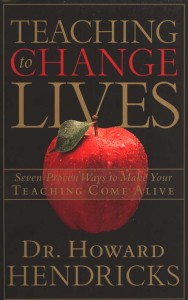The Law of the Teacher
 When I first began working with children, a friend gave me a small book that changed the way I approached teaching children. The Seven Laws of the Teacher, by Howard Hendricks, was first published by Walk Thru the Bible Ministries more than thirty years ago, but its truths still apply today. Although that edition is now out of print, it was also co-published by Multnomah under the title, Teaching to Change Lives.
When I first began working with children, a friend gave me a small book that changed the way I approached teaching children. The Seven Laws of the Teacher, by Howard Hendricks, was first published by Walk Thru the Bible Ministries more than thirty years ago, but its truths still apply today. Although that edition is now out of print, it was also co-published by Multnomah under the title, Teaching to Change Lives.
And these truths are not just for vocational teachers. They’re not even just for Sunday School teachers. They’re for parents and grandparents, aunts and uncles, and neighbors and friends who have the opportunity to pour into and influence the children in their life.
So this post is the first of a series of seven in which we’ll examine how to apply each of these truths today, as Dr. Hendricks explained them.
The first is the Law of the Teacher, which states,
“If you stop growing today, you stop teaching tomorrow.”
If you and I are not growing, we’re not teachable. And if we’re not teachable, we quickly become smug and arrogant. As Dr. Hendricks quoted one of his college professors, “I would rather have my students drink from a running stream than a stagnant pool.”
Regardless of your vocation and mine, most likely we all have children within our sphere of influence. When they look at you and me, what do they see? Do the children in our life know us as people who see ourselves as having “arrived”? People who don’t need to learn anything new, especially when it comes to influencing or teaching young ones?
Do they see us growing? Changing? Setting goals? Reading new books? Trying new experiences?
Most of all, do they see us applying Scripture in those areas of life where we’ve become spiritually “lazy”? How do we handle our possessions, finances, and time? What about a healthy diet, exercise, and other physical habits?
We don’t have to be perfect in all these areas, just growing!
How about you? How are you growing? If you’re wondering what areas of your life need attention, just ask yourself, “What passages of Scripture make me uncomfortable?” The answer will most likely point to an area of your life needing growth!

Great reminder! I did a course years ago on Howard Hendricks’ teaching philosophy and techniques by the title now out of print. Made a huge impact on my teaching. Glad to see the book is back! Thanks for sharing.
Yes, this is definitely a classic with valuable truths!
Thank you for sharing! I am going to purchase this book.
Blessings!
Wow! This is a great challenge. I need to read this book and get busy in several ways.
Pingback:The Law of Communication | Christian Children's Authors
Pingback:The Law of the Heart | Christian Children's Authors
Pingback:The Law of Encouragement | Christian Children's Authors
Pingback:The Law of Readiness | Christian Children's Authors